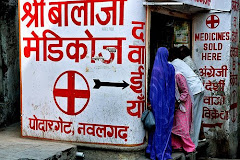 Dr. Santosh Mathew (seated right) sharing the stage with Dr. Manoj Jacob (standing)
Dr. Santosh Mathew (seated right) sharing the stage with Dr. Manoj Jacob (standing)
and Dr. Lata Mathew at the Whole Person Care plenary workshop (EMFI Conf. 2010)
Dr. Santosh Mathew from Ashok Hospital, Mumbai writes:
The EMFI Conference was a blessing to me personally.The inspiring messages from Dr Vinod Shah, Rajkumar Ramachandran, Dr. Muralidharan edified me.
Dr. Vinod Shah took a session on Christian Medical distinctives.
Here is a brief synopsis of what he said:
Christian Medical Pracctice is much more than a career or job, it is a calling, a vocation.
When we view Medicine as a Job it causes Weariness and Dehumanization
When we think it is a Career, it causes Professionalization Competition and Neurosis
When we consider it as a Vocation, it Builds knowledge of God and Deep happiness and fulfillment
Another difference lies in the Christian doctor focusing on Healing rather than merely curing. A cured person can be still hurting. Healing goes beyond the disease.
A Christian Doctor has a Patient orientation rather than a professional or a commercial orientation, and this patient orientation is of course subject to what the Christian doctor understands is God’s will. For example a patient may ask for an abortion because she feels it is the best option but the Christian Doctor knows it is against God’s will.
There are three common orientations possible in the way a Doctor looks at a patient:
1. Patient orientation: How can I best help him/her?
2. Professional orientation: How can this patient help me learn the most?
3. Commercial orientation: How can I make the most money out of him?
Christian medicine is not about great performance, rather it is about relevance!!
Christian medical career is about realizing one’s potential not competition with colleagues
Competing with oneself rather with the others.
A Christian doctor is the “master” of time rather than a “slave” of time. One redeems “time” by doing the right thing rather than always doing the “urgent” things.
Good doctoring is not about efficiency/Output. A slave of “time” can be defined as someone who focuses on “output” and forgets the “outcome or impact”.
Attitude to knowledge also differs in a Christian Doctor: Rather than using knowledge as a power tool, He is known for his willingness to share.
He or she uses knowledge to love versus Knowledge for power.
Understanding suffering
Christians believe that suffering is “redemptive”
Indian religions believe that suffering is “punitive”
The Christian God is with us in the pit sharing our pain and suffering.
Attitude to death:
Death is not a defeat for the medical fraternity.
Accepting the praise of patients: A Christian Doctor is prompt in giving the glory to God
Attitude to the unlovely/invisible and the marginalized
A civilized culture is one that looks after the “weak”
- The economically poor
- Socially powerless-women
- Old
- Jobless
- Handicapped
- HIV/AIDS, Leprosy
A civilized society is one that looks after the powerless.
The following are the Christian distinctives in medicine:
1. Having a vocation rather than just a job or a career
2. Healing rather than just curing
3. Having a “patient” rather than a professional or a commercial orientation
4. Doing relevant things rather than exotic things
5. Competing with oneself rather than with others
6. Master of time rather than slave of time.
7. Using “knowledge” as a tool to “love” rather than as a “power "tool.
8. Sees suffering as “redemptive” rather than as “punitive”.
9. Gives the glory to God rather than accepting the praise of patients.
10. Sees “invisible” people















